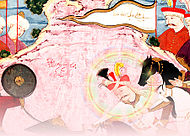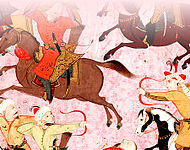- Ishikism
-
Not to be confused with Illuminationism.

Beliefs Haqq-Muhammad-Ali
Four Doors · Al-Insān al-Kāmil
Qur'an · Buyruks
Wahdat al-wujud
(Sufi metaphysics)
Zahir · BatinPractices Fasting · Sama · Music
Zakat · Ziyarat · Taqiyya
Düşkünlük Meydanı
Nowruz · Ashura
HıdırellezThe Twelve Imams Ali · Hasan · Husayn
al-Abidin · al-Baqir · al-Sadiq
al-Kadhim · ar-Rida · al-Taqi
al-Naqi · al-Askari · al-MahdiCrucial figures and influences Allah · Muhammad-Ali
Salmân-ı Fârisî · Al-Hallaj
Ibn Nusayr · Ibn ʿArabī
Yusuf Hamdani · Ahmed Yesevi
Hajji Bektash Wali · Yunus Emre
Qutb ad-Dīn Haydar · al-Sinjanī
Safī-ad-Dīn Is'haq Ardabili
Sadr al-Dīn Mūsā · Abdal Musa
Shāh Ni'matullāh-i Walī (Nûr'ūd-Dīn Kermanī) · Kaygusuz Abdal
Nāimī · Imadaddin Nasimi
Otman Baba · Sheikh Junāyd
Haydar Safavi · Ali Mirza Safavi
Khatā'ī · Balım Sultan · Fuzûlî
Pir Sultan Abdal · Kul Himmet
Kul Nesîmî · Gül BabaLeadership Tariqah and influential groups Khurramites · Kızılbaş
Zahediyeh · Safaviyya
Hurufiyya · Nuktawiyya
Bektaşi · Jelali · Ni'matullāhī
Yasaviyya · Malamatiyya
Qalandariyya · Haydariyya
Ismailiyya · Alavi Bohra
Alians · Alawites · Ishikism
Arabati Baba Teḱe
Ishikism, [pron: 'Ishik-ism] (Turkish: Işıkçılık or Işık Aleviliği), also known as Ishik Alevism or "Chinarism", refers to the movement among some Alevis who have developed an alternative understanding of Alevism and its history. These alternative interpretations and beliefs were organized by writer Erdoğan Çınar, with the publication of his book Aleviliğin Gizli Tarihi (The Secret History of Alevism) in 2004.
The Ishik movement claim that the term "Alevi" is derived from the old Anatolian "Luwi" people, claiming that the word "Luvi" means "people of light" in the Hittite language, while the term "Alevi" in traditional Alevism is believed to have derived from Ali, as in the Arabic word ‘Alawī (علوي). Some Ottoman documents from the 16th century refer to the ancestors of today's Alevis as "Işık Taifesi", meaning "People of Light". This is, according to Ishikis, a proof of the connection between the Luvians and Alevis.
Contents
Belief
Ishikis consider themselves to be esotericists, claiming that Alevism is Esotericism itself, meaning that they identify themselves with every type of esotericism in history (e.g. Jewish esotericists, Christian esotericists, Islamic and Pagan esotericism etc.)
They claim that Alevism is the oldest religion in the world, that has changed shapes throughout time. This "First and True Religion" of the world, is claimed to have been the main source for all other religions and beliefs in the world:
Aleviliğin, on binlerce yıllık geçmişten gelen, bütün inanışları etkilemiş, semavi dinlere başlangıç oluşturmuş asıl kaynak, "Serçeşme", olduğunu bütün gerçekliğiyle ortaya çıkartıyor.[1] It has now been brought into the open with all its truth, that Alevism, with its tens of thousands of years of history, has influenced all beliefs and has been the Original Source (the so-called "Serçeşme" - meaning "Beginning Spot of Fountain") of the celestial religions.The Ishikis also claim that the religious ceremonies practiced by Alevis were practiced as early as by the Hittites and even by the Sumerians. According to Ishikis, medieval Christian sects as Paulicianism, Bogomilism etc. were also Alevis. A good example of this belief can be found in the translation of the book The Cathars: The Most Successful Heresy of the Middle Ages[2] (2005) by Sean Martins. Even though the original English version does not contain the word "Alevi", the Turkish translator has translated the title of the book as Ortaçağ'da Avrupa'da Alevi Hareketi - Katharlar (An Alevi Movement in The Middle Ages - The Cathars).[3]
Views
Compared to traditional Alevism, the most striking differences of the Ishik movement are their interpretation of history. The Ishik movement claims that Alevis have changed their apparent identity several times in history in order to survive. According to Ishiki belief, heretic sects like the Paulicians and Bogomils were actually Alevis compelled to appear as Christians because of the Byzantine oppression. Likewise the modern Alevis have gained an Islamic appearance because of the Ottoman oppression.
Ishiki thought is convinced that most heterodox groups are inventions as a result of oppression, meaning that groups like the Ghulat, Ahl-e Haqq, Ismaili Shiism, Nusayri Alawism and Bektashism are in reality separate from real Islam.
Criticism
The Ishiki versus Traditionalist split has caused a deep gap in Alevi society. This is the first time in centuries that Alevis have experienced such a great split in terms of beliefs.
Traditionalist Alevis have strongly opposed the Ishikis, who they consider as people who are creating a completely new religion, or sometimes as undercover agents, trying to disrupt Alevi unity. Ishikis are also criticized for being extremely political and for abandoning fundamental Alevi sources, such as the Buyruk, one of the most known written source among Alevis.
The Alevi historian, Hamza Aksüt, responded to the works of Erdoğan Çınar in several articles, criticizing him for being intentionally manipulative and highly conspirational. were officially given as a reply to the interview with Erdoğan Çınar: Çınar'dan uyarı: 'Her flörtün sonu evlilikle bitmez' (Notice from Çınar: 'Not all flirts end with marriage').[4] Another writer, Ünsal Öztürk has also criticized Erdoğan Çınar.[5] In 2010 Hamza Aksüt, Hasan Harmancı and Ünsal Öztürk went together in publishing the book Alevi Tarih Yazımında Skandal - Erdoğan Çınar Örneği (A Scandal in Alevi History Writing - The Erdoğan Çınar Example), which is an analysis and explaining of the claimed manipulation and "tampering"[6] made by Erdoğan Çınar.
Some traditionalists have even gone so far as to demand that Ishiki dedes like Hasan Kılavuz gets the penalty of social exclusion which in reality does not correspond with the actual welcoming nature of Alevisim.
Ishiki Dedes
Even though most dedes are still traditionalists, some of them have eventually adopted Ishiki thought. The first dedes who openly declared their non-traditionalist views were Ali Haydar Cilasun, with the publication of his book Alevilik Bir Sır Değildir (Alevism is Not a Secret) in 1995 and Hasan Kılavuz in 2003. The latter is now one of the prominent figures in the Alevi Confederation of Europe (AABK) and its television channel YOL TV.
Ishiki organizations
The Ishik movement have succeeded in becoming very influential in important and powerful Alevi organizations. The Alevi Confederation of Europe (AABK) for instance, has abandoned its traditional Alevi beliefs in 2006, which it replaced with a marginal Ishiki type of understanding.[7] Recently some Alevi organizations in Turkey have also changed their definitions of Alevism.
References
- ^ idefix.com. "Erdoğan Çınar: Aleviliğin Gizli Tarihi, Chivi Yazıları, 2004". http://www.kitapturk.com/books/Kitap/19669/Aleviligin_Gizli_Tarihi.htm.
- ^ amazon.com. "Sean Martin: The Cathars: The Most Successful Heresy of the Middle Ages, Pocket Essentials, 2005". http://www.amazon.com/dp/0785821716.
- ^ idefix.com. "Sean Martin: Ortaçağ'da Avrupa'da Alevi Hareketi - Katharlar, Kalkedon Yayıncılık, 2009". http://www.idefix.com/kitap/ortacagda-avrupada-alevi-hareketi-katharlar-sean-martin/tanim.asp?sid=LTP0ZPZF62IIQ680DOZ7.
- ^ renkhaber.com. "Çınar'dan uyarı: 'Her flörtün sonu evlilikle bitmez'". http://www.renkhaber.com/haberler/Roportaj.56/Cinar_dan_uyari___Her_flortun_sonu_evlilikle_bitmez_/8270.html.
- ^ renkhaber.com. "Ünsal Öztürk: Yazın hayatının tanımadığı bir facia: Erdoğan Çınar". http://www.renkhaber.com/haberler/Yorum_Analiz.39/Yazin_hayatinin_tanimadigi_bir_facia__Erdogan_Cinar/8316.html.
- ^ idefix.com. "Harmancı m.fl.: Alevi Tarih Yazımında Skandal, Yurt Kitap Yayın, 2010". http://www.idefix.com/kitap/alevi-tarih-yaziminda-skandal-hamza-aksut/tanim.asp?sid=RFL835QZOT1TZQE8AZ9C.
- ^ aleviyolu.net. "AABF ve AABK yeni proğram değişikliği ile Aleviliği kuşa çevirmeye devam ediyor!". Archived from the original on 2008-01-26. http://web.archive.org/web/20080126095738/http://www.aleviyolu.net/15-01-2007/aabf-ve-aabk-yeni-program-degisikligi-ile-aleviligi-kusa-cevirmeye-devam-ediyor.html.
Bibliography
The primary sources of Ishikism are the works of the Turkish writer Erdoğan Çınar:
- Aleviliğin Gizli Tarihi / Demirin Üstünde Karınca İzi (2004)
- Aleviliğin Kayıp Bin Yılı (325-1325) Yolcu Ateşte Yanmak İle Yol Yanmaz (2006)
- Kayıp Bir Alevi Efsanesi (2007)
- Aleviliğin Kökleri & Abdal Musa'nın Sırrı (2008)
But he has also gained the support of other writers as well:
- Haşim Kutlu: Kızılbaş Alevilikte Yol Erkân Meydan, Yurt Kitap Yayın, 2007
Categories:- Alevism
- Esotericism
- Islam in Turkey
- Luwians
- Religion in Turkey
- Turkish culture
Wikimedia Foundation. 2010.
